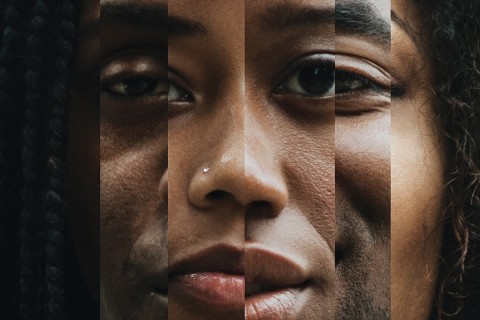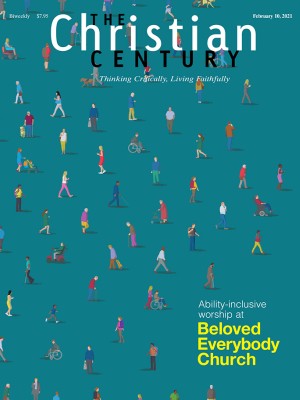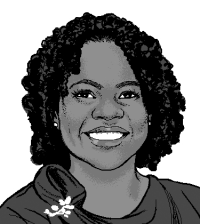Naming my African American ancestors to keep them alive
Their presence brings strength to those still fighting and grieving.

In Gadsden, Alabama, in June 1963, civil rights activist Mary Hamilton stood silently in a courtroom, having been arrested for a nonviolent protest. She refused to answer the prosecutor’s questions until he called her “Miss Hamilton.” She was jailed and held in contempt of court. Eventually her case landed before the Supreme Court, which, in Hamilton v. Alabama, rendered a final decision that no court could address Black witnesses differently than it addressed White ones.
How and why you call someone’s name has always mattered deeply to Black people. Growing up, I dared not call any adults I knew by their first names alone. Before the weighty first names of the older Black women from my church and neighborhood—Sadie, Earnestine, Mildred, Frances, Vivian, Beulah, Johnnie Mae, Hattie, Virginia, and Etta—always came an honorific or a title. For people at church, we used Sister, Brother, Deacon, Elder, Mother, or Pastor. At home, we used Auntie, Uncle, Mr., or Mrs.
Read our latest issue or browse back issues.
These titles were rooted not in formality but in intimacy. They were not about artifice but about respect, which we were taught was the basis of the relationship between children and adults. They were also about granting dignity in a country that historically afforded very little to African Americans.
Years ago, I began to incorporate the practice of calling my ancestors’ names in my devotional life and also in my work as a scholar. I explicitly call the names of the dead, at least the names I know and to whom I am tied by flesh and blood. I also call on the ancestors from whom I am many generations removed and to whom I may not be biologically related. Like many African Americans, I can only trace my family lineage to a certain point, and I have more questions than answers about my actual family tree. So I include among my ancestors all peoples of African descent throughout the diaspora, everyone caught in the tangled web of transatlantic slavery and its afterlives.
Some Christians are deeply afraid of other cultures and religious traditions in which worship of the ancestors is routine. Anti-Black sentiment, even within some African American Christian spaces, makes many deeply suspicious of African practices that invoke the presence of ancestors. But as a Black woman whose family history has been disrupted by the institution of slavery, I find that naming, remembering, and calling upon the ancestors is a profound act—not of worship but of veneration. It cultivates in me a deep respect for my forebears and awe at their wisdom and strength.
Calling upon the ancestors is about memory: remembering how I am connected to a web of humanity that does not end when our bodies have returned to dust. I want to excavate these ancestral memories, to listen as voices speak to my heart across time and distance, to pay attention to the stories of people whose voices were silenced when they were alive. I feel the presence of these ancestors encouraging me to speak truth in places and spaces they were never allowed to enter.
My ancestors include those exiled by slavery, war, and genocide, forever seeking but never finding a place that feels like home. My ancestors include those who worshiped the sun, the moon, or the earth itself, pouring out libations in praise and awe of creation’s beauty. My ancestors include those whose bodies now rest on the bottom of the Atlantic Ocean, not having survived the perilous journey to the “New World.” My ancestors include those who fought their chains and those who stoically endured theirs. Some of them arrived in 1619, when some 20 or more Africans arrived at Point Comfort, Virginia—brought to this land as human beings only to die as chattel slaves. Whoever they were, I am linked to them. I want to remember them, and I want to honor them.
I often begin my classes on African American religious history with a list of names—but not of the great people of the Christian tradition or the churches and institutions that have contributed to this legacy of faith. I begin, rather, with a list of the names of the cargo ships used to transport enslaved African people from the shores of one continent to the other. I read the names of these ships, sometimes with the names of the ship captains and in concert with the entity that sponsored each voyage.
I do this so my students will know that many of those who were enslaved first encountered the symbol of the cross when they saw it flying on the flag of the ship that carried them to enslavement. My students need to know that there was a Portuguese slaver’s ship named Bom Jesus do Triunfo and a Spanish slaver’s named Jesús y Espíritu Santo—among many others—that sailed with the explicit purpose of enslaving other human beings.
These are the names that history records and remembers: captains, slave owners, financial companies, churches, and denominations that earned their wealth by trafficking African bodies. There are no records of the names of those whose bones now litter the ocean, some choosing to jump to their deaths in acts of defiance, others thrown overboard when ill or dead, treated like debris. To call on the names of my ancestors is to refuse to forget the horror they faced. To speak their names is to keep them alive.
As a graduate student, I read Thomas Jefferson’s Notes on the State of Virginia for the first time. In the section in which Jefferson delineates his perception of the differences between enslaved persons and White citizens, he writes that the griefs of members of the Negro race are “transient.” Their afflictions, he claims, “which render it doubtful whether heaven has given life to us in mercy or in wrath, are less felt, and sooner forgotten with them.”
I closed the book after reading those words. It was a cold and snowy winter day, typical for Ithaca, New York, and I sat and stared out the window of the library for a long time. I was not surprised by Jefferson’s racist words; I knew too much about the lives and history of the Founding Fathers of this nation to ever be shocked by their heinous acts and unmitigated support for the brutality of enslavement. But his words about grief and transience took me immediately to a place of personal loss, a place from which I’d long tried to escape.
I am sitting at my grandmother’s funeral, thinking about the phone call that upended my world. The all-too-quick death. The train ride back to New York City. My entire world transformed overnight. I am unable to feel the grief of the moment, exhausted from the unending tasks that fall on my shoulders. There is no one else left; they are all gone. I am all she had left, the last of this family line. I cannot cry because I fear that if I were to begin, I would never stop.
And so I sit in the front row of the church, a place I have known for years, surrounded by people I have not seen since I finished high school, and I am frozen in time. I am looking at the funeral program in my hand, reading an obituary I scarcely remember writing and staring at a picture that I do not ever remember seeing. And while the eulogist is preaching this final sermon, he calls my grandmother’s name. I look up because he has called her Virginia.
My grandmother’s name is Vivian.
I look swiftly to my right and to my left, a bit frantic. Did anyone else hear him call my grandmother by the wrong name? I stare, once again, at the program I have in my hand and the obituary I wrote myself, to confirm that her name is printed correctly. Yes, her whole beautiful name is there. I shake my head, determined to clear a mind that I know is clouded with grief. Maybe I heard him wrong. There is no way that he said the wrong name. There is no way that you get something like that wrong at this time and in this place.
And then the minister repeats himself. Four times he calls what he believes is the right name, and four times he fails. Four times he calls the name of some strong southern woman—Virginia—who is surely someone else’s beloved grandmother. But it is not the name of the one I know and love.
After the funeral, I attempt, through heaving sobs, to explain to anyone who will listen that the preacher never said the right name. Only then do I truly begin to grieve the death of the woman who raised me and loved me. Kindhearted people attempt to explain to me that the preacher simply made a mistake, that he certainly meant no personal disrespect to me or my grandmother. I am left unable to explain in rational terms why this second blow, calling my grandmother by the wrong name, wounds me as deeply as the news of her death.
Remembering my grandmother’s funeral in that library in Ithaca, New York, I sat with the absurdity of Jefferson’s idea that grief for Black people is transient. And I thought of how too many pastors, particularly African American pastors, face the reality of funeralizing the very young: those who died violently, those whose lives were cut short by the ravages of disease, those who died at the hands of those sworn to protect them. How do you comfort a grieving Black mother whose only son has been killed by the police? What words do you offer a community when the scourge of gun violence kills elementary school children walking home in the middle of the afternoon? What can you say to Black parents whose greatest fear is that their child will not live long enough to graduate from high school?
I wondered if we should bring back the tradition of the mourning women of Jeremiah 9:17: “call for the mourning women, that they may come; And send for skillful wailing women, that they may come.” In the biblical context, women worked as professional mourners, particularly for the wealthy. And throughout world history, in almost every religion and culture, women have served as transmitters of lament.
Black women, in particular, have a reservoir of pain and tears from which to draw. In our capacity as “mourning women,” we have generations of trauma from which to pull. Our laments are both corporate and personal, but there is often no safe space in which to share our pain. The larger world believes that Black women are so accustomed to tragedy—impervious even to physical pain—that our personal losses barely register with other people.
I have been grieving my whole life. I keep wondering when the pain of so much loss will stop. I keep asking myself when my decades of grief will finally come to an end. When will the hole and empty space in my heart ever be filled? The cliché́s of my faith provide little comfort. God did not need another flower in the garden. God did not need another angel in heaven. No good came out of my loss, and it was far more than I could bear.
And so I sit with the stark reality that you cannot escape grief. Grief will come for you and change your entire world. Grief will change your name, change your address, and change your sense of who you are. No accomplishment, no title, no honorific, no degree will alter the reality of my identity as a motherless child.
There is a ritual in some churches that commemorate Holy Saturday, usually a late evening service. The parishioners arrive quietly, and the person leading the service blows out any candles that may be lit and turns off all the lights in the building. The congregation sits together for several hours, waiting, in silence but with great expectation, for the coming dawn. Sometimes there is an empty coffin present at the altar.
This coffin is the tomb of parents mourning the deaths of their murdered children, with no hope that justice will prevail. It is the tomb of families at the borders who must choose between uncertain life or inevitable death. It is the tomb of those holding a vigil at a loved one’s bed in hospice. It is the tomb of a mother who must choose between feeding her babies or paying the rent. It is the tomb of barren wombs, lack of love and healthy touch, and few choices for the future. This coffin is the place where hope unborn has died.
It is a powerful worship experience to simply sit with death and all of its various representations: doubt, fear, loneliness, disbelief, and weariness. You know that the dawn will come, that the lights will be turned back on and the candles relit. Sitting in that silence prepares your heart for a resurrection and a rebirth. Even if that hope feels long delayed.
A version of this article appears in the print edition under the title “Power in naming.” The article is adapted from Yolanda Pierce's book In My Grandmother's House: Black Women, Faith, and the Stories We Inherit, published this month by Broadleaf Books.






